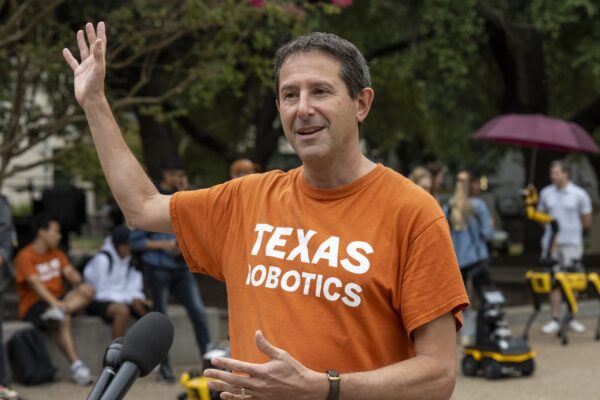Long-term autonomy in robotics and the ability of robots to function independently for extended periods are poised to revolutionize how we live. As part of The University of Texas at Austin’s showcase at the South by Southwest Conference — Hook ’em House at Antone’s — on March 8, 2024, Peter Stone, UT professor and executive director of SonyAI, will participate in the panel “AI-Enabled Robots: Possibilities, Challenges and Ethics.”
Stone will explore the future of household robotics with expert Andrea Thomaz, CEO of Diligent Robotics and an adjunct UT faculty member, with Jackie Snow of the Wall Street Journal moderating. This session will explore the possibilities, challenges and ethics of integrating AI and autonomous robots into our daily lives.
1. Are there examples of an AI-enabled robot that some people might already own? Roomba comes to mind, but perhaps that doesn’t qualify as machine learning.
The most commercially successful domestic robots so far are certainly vacuum cleaners such as the Roomba. They have the advantage of just needing to navigate through the home; they do not need to pick up or manipulate anything. The AI embedded pertains mainly to algorithms for efficient path planning.
Beyond vacuum cleaners, another type of robot that people may own in their homes are entertainment robots, or toys. The Aibo was an early example. These robots have the advantage of not needing to be reliable or “useful” in any meaningful way. In fact when they make mistakes, they are often considered “cute.”
Finally, cars these days are becoming closer and closer to being considered robots. Certainly cars that are fully self-driving are robots.
2. What are the main challenges in this space? What needs to be overcome to make these commonplace?
If you’re talking specifically about robots in the home, the biggest challenge is that they need to be both useful (except for entertainment robots) and affordable. Currently, the most expensive appliances in peoples homes are usually their refrigerators, which cost in the neighborhood of $1,000. Currently, it’s hard to imagine robots anywhere near that price point that do much more than vacuuming or entertaining.
3. What is an ethical question around this technology that many people might not have considered, including issues stemming from unintended consequences?
There are many in the news all the time these days relating to bias, privacy, fraud, copyright infringement and more. Actually, I’m pleased to see that the level of discourse around AI technologies has gotten a lot more nuanced in the past few years. I think that people who have been paying attention are pretty well-versed on the range of ethical questions these days. If anything, some ethical questions are considered too much. For example, I think the “trolley problem” that focuses on the rare situation of an autonomous car needing to choose among multiple fatal outcomes draws attention away from some of the more pressing issues listed above.
The panel is Friday, March 8, at 2:30 p.m. at Antone’s (305 E. 5th Street) upstairs.




